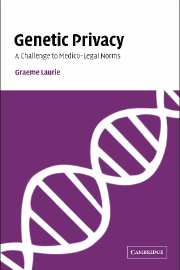Book contents
- Frontmatter
- Contents
- Preface
- Table of cases
- Table of legislation
- International instruments
- Miscellaneous documents
- 1 Health care, patient rights and privacy
- 2 Privacy: anti-social concept or fundamental right?
- 3 Human genetics and genetic privacy
- 4 Autonomy, confidentiality and privacy
- 5 Privacy and the public interest
- 6 Privacy and property?
- Index
4 - Autonomy, confidentiality and privacy
Published online by Cambridge University Press: 25 June 2009
- Frontmatter
- Contents
- Preface
- Table of cases
- Table of legislation
- International instruments
- Miscellaneous documents
- 1 Health care, patient rights and privacy
- 2 Privacy: anti-social concept or fundamental right?
- 3 Human genetics and genetic privacy
- 4 Autonomy, confidentiality and privacy
- 5 Privacy and the public interest
- 6 Privacy and property?
- Index
Summary
Challenging medico-legal paradigms
Much ink has been spilled discussing the ramifications of genetic advances for individuals, communities and society at large. As we have seen, a central concern has been the problem of regulating access to, and control of, the genetic information that has been produced as a result of rapid progress in the fields of genetic research and genetic testing. To date, discussion has rightly focused on the uses to which genetic test results should be put, and, indeed, on the logically prior question of whether genetic information should be sought at all in certain circumstances. Debate has, however, tended to polarise the issues under scrutiny, setting the individual against the state or other interested parties such as insurers or employers. Moreover, from the perspective of the individual, the interests that have been identified as being at stake have centred on the autonomy of persons and the ‘right’ that they have to control personal genetic information. While these are important starting points, it should be realised that the discourse has barely begun on the appropriateness of social, ethical and legal responses to the challenges that are thrown up by such scientific advances.
We have examined the nature of the interests at issue to determine precisely which factors, values, perceived benefits and adverse consequences should be assessed when deciding how genetic information should be handled.
- Type
- Chapter
- Information
- Genetic PrivacyA Challenge to Medico-Legal Norms, pp. 182 - 244Publisher: Cambridge University PressPrint publication year: 2002



